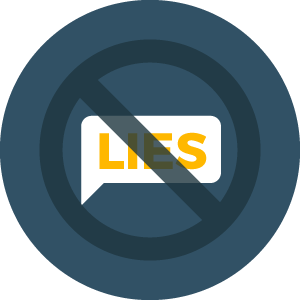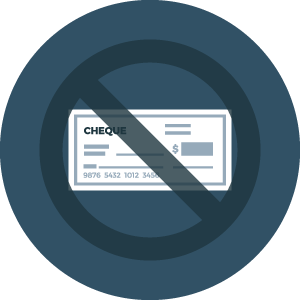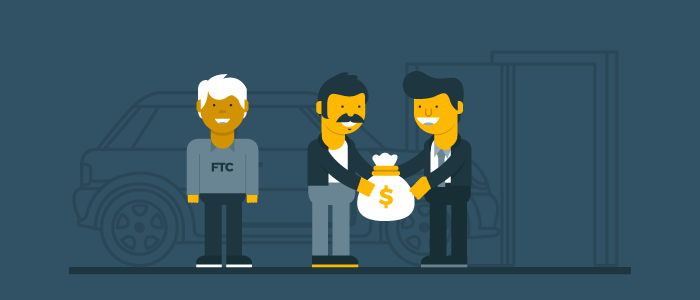Talk to Sales: (401) 200-6026
“Operation Collection Protection” targets illegal debt collection practices across the country. Is your dealership in compliance?
You are undoubtedly familiar with the Federal Trade Commission, aka the FTC. The FTC is the government agency that works on behalf of consumers to prevent fraudulent, deceptive, and unfair business practices — and that includes monitoring anything fishy that’s happening at your dealership. They’re the reason you hired a compliance officer, and why you’re committed to following laws like the Used Car Rule and the Gramm-Leach-Bliley Act.
The FTC announced a new enforcement initiative in late 2015 called “Operation Collection Protection.” If you haven’t heard of it, and you own a BHPH dealership or have in-house financing, you could be part of this nationwide crackdown if you’re not following the rules of debt collection. Operation Collection Protection is the first coordinated federal-state enforcement initiative that targets deceptive and abusive debt collection practices. This includes illegal tactics such as harassing phone calls, false arrest, litigation, or wage garnishment threats.
 There federal government already has debt collection laws in place, so why has the FTC created this separate initiative? The agency receives more complaints about debt collection than any other industry. There are nearly 30 million Americans with accounts in collection, and while many debt collectors are legitimate and follow the law, there are many others who have forced the FTC’s hand in this crackdown.
There federal government already has debt collection laws in place, so why has the FTC created this separate initiative? The agency receives more complaints about debt collection than any other industry. There are nearly 30 million Americans with accounts in collection, and while many debt collectors are legitimate and follow the law, there are many others who have forced the FTC’s hand in this crackdown.
What you should (and should not be) doing according to Operation Collection Protection
Operation Collection Protection isn’t creating new rules of the road to surprise or scare you — the FTC is just enforcing the Fair Debt Collection Practices Act (FDCPA), which has been effective since 1978.
If your dealership is part of the debt collection process, your officers may get extremely tired of people avoiding them or giving them excuse after excuse for non-payment. This is understandable, but it’s also a part of their job. No matter how frustrating collecting an unpaid auto loan may be, the FDCPA completely forbids certain collection practices. Those methods include:
 Harassment: You may not harass, oppress, or abuse anyone you contact about debt. Using obscene language, repeatedly calling someone, and threatening violence or public humiliation are strictly forbidden.
Harassment: You may not harass, oppress, or abuse anyone you contact about debt. Using obscene language, repeatedly calling someone, and threatening violence or public humiliation are strictly forbidden.- Making false statements: Some debt collectors think it’s okay to tell one “small” lie to push a debtor to pay, but that is entirely untrue. Common lies that deceitful debt collectors tell include telling the individual they’ve committed a crime, indicating papers are legal forms when they are not, or misrepresenting the amount the person owes. Some debt collectors even use fake company names or give false credit information to a credit reporting company.
- Unfair practices: You cannot engage in unfair practices when attempting to collect a debt. Unfair practices could involve depositing a post-dated check early, contacting a debtor by postcard, or threatening to take a person’s property if it would not be legal to do so.
 You also should not contact borrowers before 8 a.m. or after 9 p.m., unless the person tells you that you can. And this should go without saying, but you may never, never pretend to be someone else when you call about debt. There are more explicit rules when it comes to the FDCPA, so if you’re still unsure if you’re following them correctly, speak with an attorney to make certain that your dealership is abiding by the rules. Dealerships in violation may be fined or have their financing office shut down completely.
You also should not contact borrowers before 8 a.m. or after 9 p.m., unless the person tells you that you can. And this should go without saying, but you may never, never pretend to be someone else when you call about debt. There are more explicit rules when it comes to the FDCPA, so if you’re still unsure if you’re following them correctly, speak with an attorney to make certain that your dealership is abiding by the rules. Dealerships in violation may be fined or have their financing office shut down completely.
Avoid Operation Collection Protection and hire the right debt collectors
Always take great care in hiring any dealership employee, but never rush hiring a person to manage accounts in collection. You need someone who is not just good at what they do but knows how to do it 100% legally. If you choose the wrong person, your entire dealership could be on the line.
Think about some of the traits you look for in a new car salesperson, like the ability to build rapport, control conversations, and overcome objections. Your debt collector should have similar abilities because his job is to convince a person that it’s in their best interest to pay his or her debts. And just like your salespeople would never lie or threaten a customer in an attempt to get them to buy a car, your debt collector should have the same mentality.
The individual you hire to handle debt collections should also be compassionate. You want to get paid, but they are also representing your business, and you don’t want a reputation for being a monster. Your debt collector should have a thorough understanding of the reasons why people aren’t paying their loans — often it’s because they’ve lost a job or the car broke down and they can’t afford to fix it. The collector should be solution-oriented and able to broker a deal that helps your dealership and the consumer in the long run.
Take some time in the next week to check in with your collections department and speak to them about Operation Collections Protection. Ensuring department-wide compliance and pushing the importance of the FDCPA should keep your collections running smoothly and without any legal trouble.
Interested in an Affordable, Full-Featured Auto Dealer CRM?
Schedule an AutoRaptor Demo Now!





